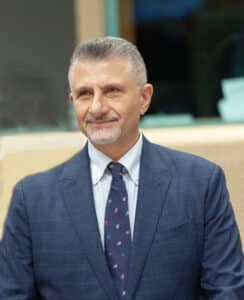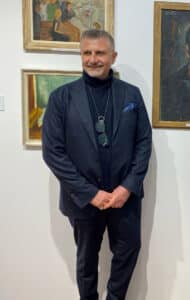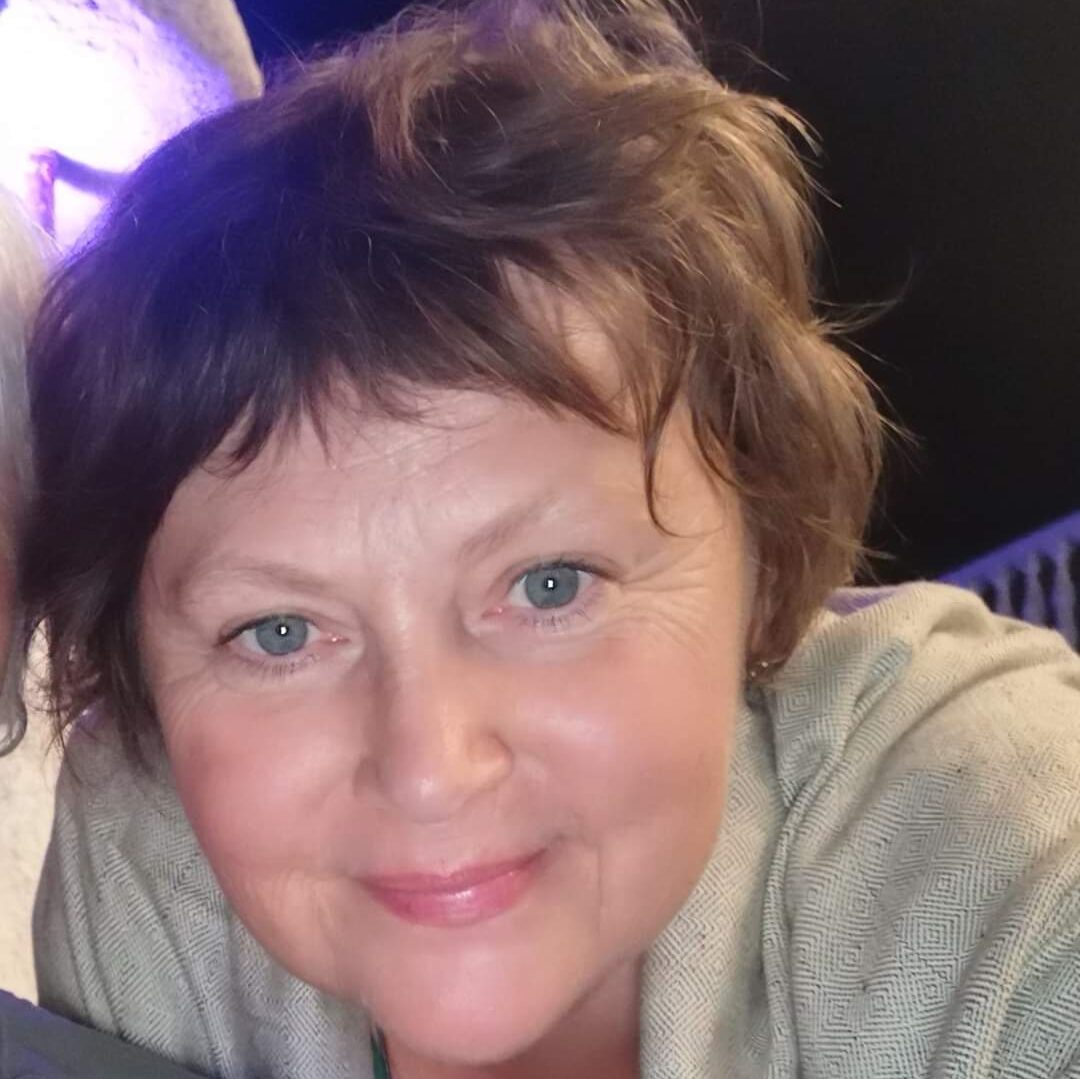Installed only eight months ago, AGNIESZKA RAKOCZY speaks to the newest member of the outgoing cabinet, a man who has served in many roles on the island’s arts scene
The office of deputy minister of culture Yiannis Toumazis is in a beautiful old mansion on Gladstonos Street, in one of the most prestigious districts of Nicosia. Located along the Pedieos river, the area still has an air of the old Cyprus that is fast disappearing from elsewhere in the capital.
“When we came here, the building was in bad state, neglected, under-used”, Toumazis says as he shows me around. “It used to be a Centre for Scientific Studies and belonged to the Ministry of Education. I asked for it and they allocated it to us. When we came here, there were no chairs, tables — nothing. First couple of months, I would sit here in this room while work was being done all around me.”
I eye the paintings that now adorn the walls. For sure, the deputy minister has good taste – Glyn Hughes, Diamantis, Votsis. I voice my approval to Toumazis, who laughs. Yes, these are his personal choices but now that the government is about to change who knows what will next hang on these walls?
Toumazis was appointed to his position some eight months ago, making him the most recent addition to “the just about to depart government of Nicos Anastasiadis”, in a position he says was very much needed. Previously cultural issues were handled by the ministry of education. “Naturally, with so many issues under its umbrella, the education ministry was very busy. Many issues in the culture department remained unresolved for years.”

Toumazis clearly knows what he is talking about. A former director of the Nicosia Arts Centre and the Pierides Foundation, president of the Cyprus Theatre Organisation (Thoc) and vice-president of the bicommunal technical committee on culture, professor of history and theory of art at Frederick University, he has been active on the Cyprus art scene for more than 30 years, during the course of which he has participated in one way or another in most of the island’s key cultural developments.
Toumazis was born in Famagusta in 1960, his father being medical doctor and MP Andreas Toumazis. His mother Emiliana was also medically-trained, assisting her husband run his clinic, which was situated on the outskirts of the old town. She was also one of the first tour guides on the island and as such was permitted to enter the old Turkish Cypriot quarter.
Looking back, he recalls how some of his earliest memories involve hiding — “hiding under the operating table in my father’s clinic, watching him operate”; hiding on a tourist bus, going with my mother into the old town and seeing the big square – like a scene from One thousand and One Nights!
Toumazis’ memory of his childhood Famagusta is that it was “very cosmopolitan”. It was a place where he had “a lot of freedom as a child — cycling alone with my elder brother to the cinema in the evenings and so on — but they were also turbulent times [as the family] lived through all these intercommunal problems… I remember, for example, seeing the corpses of two Greek Cypriot men who were shot when they tried to enter the old city, the first time and I hope the last that I saw bodies with bullets in them… I think it was 1964. And the discussions at the family table, the arguments about politics… so yes, the life was nice life but politically it was hell and it had a huge impact on me.”
During the war of 1974, his parents were on the front line, helping wounded soldiers, and then after the first phase of the invasion his mother was appointed the Red Cross representative for the whole of Famagusta region which meant she had to travel a lot. Yiannis often joined her on these missions “checking the situation in Karpas or helping refugees from Kyrenia.”

At the Thalassa museum
He also experienced the bombardments, especially when staying in his grandparents’ house in Ayios Memnon: “I remember digging holes under the orange trees to hide from the two white spots that appeared on the horison, then hearing explosions and feeling worms crawling all over me”. For several months they lived in a leaking refugee tent, before he and his brother finally moved to Limassol to join their uncle. His parents, meanwhile, remained behind in the tent because of their work in a hospital in Ormidhia in Larnaca district.
“Adopting to this new life, new school and new people wasn’t easy,” he acknowledges. “People in Limassol didn’t have any war experience. I remember the first night when we came from Famagusta as refugees and the neighbour came to ask us what it was like to be bombed… And the story of a very good friend of my mother, a wealthy Famagustian lady who overheard the counter assistants in a glassware shop whispering that she should be watched carefully because she was a refugee… The poor lady got so upset she bought a dozen glasses, paid for them and then threw them on the shop floor and left… And at the same time yes, we had no money, no clothes, no food. I was going to the welfare office to collect our rations of beans, corn beef, flour, sugar… it was a shocking experience…”
Slowly however life returned to normal. Toumazis’ parents also came to Limassol and started rebuilding their life. His mother continued to be a tourist guide and his father opened a small examing room, mainly for Famagusta people, and was later elected an MP. Toumazis ended up studying civil engineering at the prestigious Athens National Polytechnic even though in his high school years his interest focused on the arts.
“We were the first generation to graduate after the war. Times were difficult and there was this general feeling that we should all become doctors, engineers, lawyers… And I was always a good pupil, so I thought, OK, I will become a civil engineer. But very quickly I realised that it was wasn’t what I wanted.”
While his determination to complete the course never wavered, he felt he owed it to his parents and himself, Toumazis also began attending art classes. So on graduating as an engineer, rather than looking for job he left for the Netherlands where he enrolled at the Utrecht School of Arts to study stage design. He never looked back.
“By then my father had passed away and my mother worked very hard to help me. I owe her a lot. We share the same birthday, so we have similar characters and even though she worried she understood me. And yes, Holland was was very difficult at the beginning. It was a cultural shock moving there from the very conservative engineering school in Athens and being five years older than the other students. But I enjoyed it immensely. It was the most creative time in my life.”
After graduation, Toumazis got a job in the Netherlands and had scant thought of coming back to the island. Then, while visiting his mother, he was approached by the Diaspro Gallery in Nicosia with the offer of an exhibition. The show was an artistic success among the gallery’s many visitors, and some of the island’s known art connoisseurs, including geneologist and art dealer Aristeidis Koudounaris plus the founder of the Pierides Foundation Demetrios Pierides. Toumazis also came to the attention of the then Nicosia mayor Lellos Demetriades.
“The year was 1989 and they were talking about creating the municipal arts centre in Nicosia. And this is how it started…”
Their ensuing discussions focused on an empty building in the old town of Nicosia, the so-called Powerhouse, which belonged to the Electricity Authority of Cyprus. The Nicosia Municipality and the Pierides Foundation joined forces to renovate it and in 1994, NiMAC (the Nicosia Municipal Arts Centre) was inaugurated, with Toumazis becoming its director. NiMAC has since mounted more than 90 modern and contemporary art exhibitions, with the participation of artists both from Cyprus and abroad.
“When NiMAC was being created there was no other institution on the island similar to it. So its purpose was to get Cypriots aquainted with what was happening with the contemporary art — to get our artists out there and to work with artists from abroad, to create networks,” Toumazis explains.
It was the first of a series of pioneering art projects he was to help initiate. Others include the THOC staging of two of the great Greek tragedies (Hippolytus by Euripides and Antigone by Sophocles) at the ancient Salamis amphitheatre in the north.
These two productions, under the auspices of the Bi-communal Technical Committee on Culture in 2015 and 2016, marked the first (and to date, last) occasions that such Greek tragedies have been staged in Salamis since 1974. Their staging stirred up controversy. Toumazis, at the time Chairman of the Thoc board and deputy chair of the Committee on Culture, remains unrepentant.
“The criticism was unfair and ugly. These were two very important events that brought the two communities together within the cultural sphere and showed how we could coexist and create together.”
Another event during his time on the committee was the Turkish Cypriot community’s return in 2020 of 219 paintings by major Greek Cypriot and Greek artists that had remained in Famagusta since 1974. “These three events show the power of culture on this island and how things can be if we really collaborate and work together,” he maintains. “The way Turkish Cypriots safeguarded these paintings, protected them and then with great difficulty brought them to us, was really unprecedented…”
So what will happen with the deputy ministry of culture, once the presidential elections are over and a new minister enters the building?
Toumazis considers the question, then smiles. “A lot has been accomplished within these last eight months. The ministry I have been building is very anthropocentric because it has to deal with the problems of people, artists yes, but not just artists, since culture is not solely about artists. It is a big ecosystem, a huge industry that embraces all the people who deal with cultural activities.”
There is still a lot to do. “The ministry is now working on the final draft of new legislation defining the status of the artist, which is to be submitted to the public sphere for consultations. We are also in process of amending the intellectual property law and improving tax incentives for investment in art. We hope to announce a network of residencies for Cypriot and foreign artists in various cultural fields so that they can work together in different parts of Cyprus with local communities. We have just reformulated the Kypria festival label, redirecting its budget to become a funding mechanism for existent and new regional festivals so that they can develop their own capabilities. The Cyprus Handicraft Services now comes within the ministry’s scope of work, provision having been made for a major EU grant to upgrade it.”
Later this year, the plan is for the Department of Antiquities to also come under the ministry, a move Toumazis views as marking “an extremely important development given that our history, along with our culture, is our biggest asset, one that we need to develop and explore both locally and internationally.”
He concludes on an upbeat note. “This is a pilot year for all of this and because finally we now have an official umbrella, i.e. a ministry devoted to culture, I believe the future is bright.”
And what does the fututre hold for Yiannis Toumazis? “Well, I don’t know what I will do but I am always open to new challenges…,” he says with a twinkle in his eyes.







Click here to change your cookie preferences